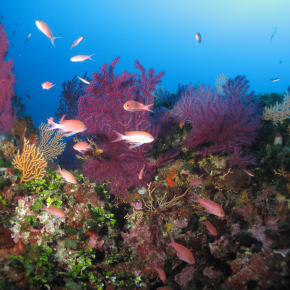
France 2030: French government invests €41 million in a large-scale research programme to unlock the secrets of marine genomes
The Atlasea research programme was officially launched on Wednesday, January 11 by Sylvie Retailleau, Minister of Higher Education and Research, along with Bruno Bonnell, General Secretary for Investment in charge of the France 2030 plan.
An exploratory PEPR co-directed by CNRS and the CEA, Atlasea aims to sequence the genomes of some 4,500 marine species found in France’s exclusive economic zone. Allotted a budget of €41 million over eight years as part of the France 2030 investment plan, it will make it possible, among other things, to further the understanding, protection and study of the full range of life forms in all their diversity.
In synergy with the many international initiatives to sequence biodiversity, France is giving new impetus to its research in the field of marine biology. The country has the benefit of the world’s second largest maritime territory, after the United States, as well as leading-edge research in marine biodiversity and a strong economic fabric derived from the marine biotope.
The national government has earmarked €3 billion for research through directed (specific) or exploratory “Priority Research Programmes and Infrastructures”, or PEPRs, which make up the upstream-research component of the France 2030 strategies. Atlasea has been awarded one of the exploratory PEPR grants, targeting emerging scientific or technological sectors for which the government seeks to identify and build the communities.
Sequencing a genome makes it possible to trace the evolution of biological processes, and also to record an individual’s genetic information, examine its cellular functions and determine its genetic distribution. Access to this information for a large number of species will be crucial for the future of biology. So far, 12,000 species have been documented in the exclusive economic zone of metropolitan France. This PEPR aims to sequence the genomes of several thousand of them on the coasts of the mainland plus several hundred in overseas French territories, primarily targeting species of scientific or economic value, in particular for the discovery of new biosourced antibacterial agents or processes for the breakdown of plastics by marine organisms.
The programme will comprise three stages:
- Gathering samples on the coastlines and through offshore and undersea expeditions (notably in Mediterranean canyons where life forms have been able to develop in the absence of light);
-The sequencing of these samples at Genoscope, the National Sequencing Centre, in order to identify reference – i.e. complete – genomes. Genoscope is a department of the CEA’s François Jacob Institute of Biology. Located in the town of Evry-Courcouronnes since 1996, it has a staff of 180 researchers;
- The digital annotation of this DNA to identify genes, trace their evolutionary history and determine their functions. The genomes will ultimately be stored in open databases accessible to the international community.
In parallel, in order to make full use of the data generated by the project, two calls for proposals will be launched in the scientific sphere. The first will concern molecular mechanics, with the goal of characterising the metabolic pathways that lead to molecules naturally produced by the marine biotope and of potential value in medicine, cosmetics, agriculture, etc. The second will seek to explain the mechanisms of species invasion in a given ecosystem based on reference genomes, to determine whether such invasions result in the hybridisation of similar species, if an invasive species owes its success to natural selection, etc.
Training will also be an important part of the programme in order to maintain France’s level of expertise in sequencing, with summer schools, workshops, doctoral supervision, etc.
Lastly, the programme will fund public-private partnerships for the use of genomic data. The idea is to nourish the process of research and development in marine biotechnologies based on genomic knowledge, promoting awareness among French companies that are already working with marine products.
To implement these actions, the CEA and CNRS, co-directors of the PEPR, will be backed by five academic partners: Ifremer, the MNHN, Aix-Marseille Université, Paris Sciences Lettres and Sorbonne Université.
Overview of the France 2030 investment plan
- Based on a dual ambition: to lastingly transform key sectors of our economy (e.g. healthcare, energy, automobile, aeronautics and space) through technological innovation, and to establish France as not only an active force but a leader in the world of tomorrow. From basic research to the emergence of a concept to the production of a new product or service, France 2030 will provide support for the entire life cycle of an innovation all the way to its industrialisation.
- Unprecedented in scope: €54 billion will be invested to help our nation’s companies, universities and research institutions achieve fully successful transitions in these strategic sectors. The ultimate goal: to enable them to offer a competitive response to the ecological and desirability challenges of the coming world, producing the future leaders of our sectors of excellence. France 2030 is defined by two transversal objectives, consisting of devoting 50% of its spending to the decarbonisation of the economy and 50% to emerging players and forces of innovation, with no spending that could prove harmful to the environment (in keeping with the “Do No Significant Harm” principle).
- To be implemented collectively: conceived and deployed in cooperation with local and Europe-wide economic and academic forces for the definition of its strategic orientations and key actions. Project leaders submitting proposals are offered step-by-step support from the government in the course of open, strict and selective submission procedures.
- Supervised by the General Secretariat for Investment, under the authority of the Prime Minister, and implemented by the Agence de la Transition Écologique (Agency for Ecological Transition, or ADEME), Agence Nationale de la Recherche (National Research Agency, or ANR), Bpifrance, and the Caisse des Dépôts et Consignations (CDC).
For more information: https://www.gouvernement.fr/france-2030 | @SGPI_avenir


